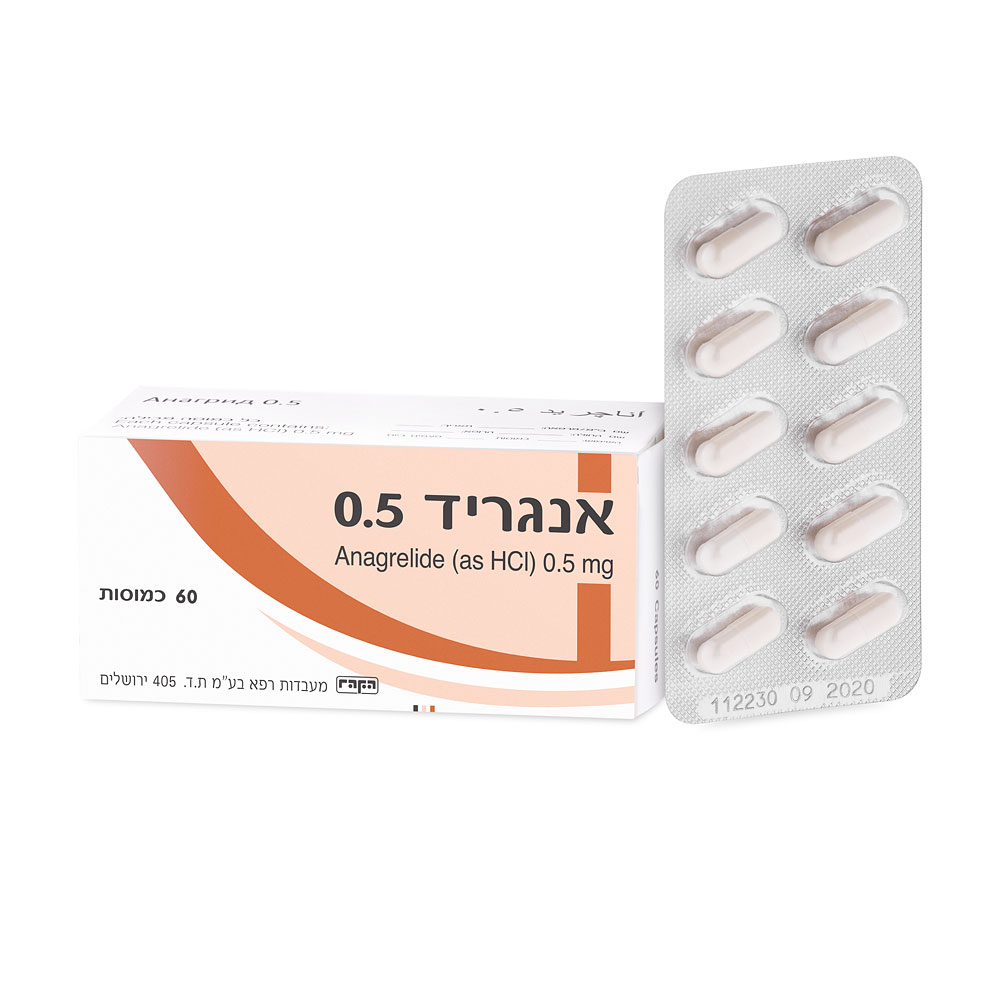Quest for the right Drug

אנגריד 0.5 ANAGRID 0.5 (ANAGRELIDE AS HYDROCHLORIDE)
תרופה במרשם
תרופה בסל
נרקוטיקה
ציטוטוקסיקה
צורת מתן:
פומי : PER OS
צורת מינון:
קפסולות : CAPSULES
עלון לרופא
מינוניםPosology התוויות
Indications תופעות לוואי
Adverse reactions התוויות נגד
Contraindications אינטראקציות
Interactions מינון יתר
Overdose הריון/הנקה
Pregnancy & Lactation אוכלוסיות מיוחדות
Special populations תכונות פרמקולוגיות
Pharmacological properties מידע רוקחי
Pharmaceutical particulars אזהרת שימוש
Special Warning עלון לרופא
Physicians Leaflet
Posology : מינונים
4.2 Posology and method of administration Treatment with Anagrid should be initiated by a clinician with experience in the management of essential thrombocythaemia. The recommended starting dose of anagrelide is 1 mg/day, which should be administered orally in two divided doses (0.5 mg/dose). The starting dose should be maintained for at least one week. After one week the dose may be titrated, on an individual basis, to achieve the lowest effective dose required to reduce and/or maintain a platelet count below 600 x 109/l and ideally at levels between 150 x 109/l and 400 x 109/l. The dose increment must not exceed more than 0.5 mg/day in any one-week and the recommended maximum single dose should not exceed 2.5 mg (see section 4.9). During clinical development doses of 10 mg/day have been used. The effects of treatment with anagrelide must be monitored on a regular basis (see section 4.4). If the starting dose is > 1 mg/day platelet counts should be performed every two days during the first week of treatment and at least weekly thereafter until a stable maintenance dose is reached. Typically, a fall in the platelet count will be observed within 14 to 21 days of starting treatment and in most patients an adequate therapeutic response will be observed and maintained at a dose of 1 to 3 mg/day (for further information on the clinical effects refer to section 5.1). Older people The observed pharmacokinetic differences between older and young patients with ET (see section 5.2) do not warrant using a different starting regimen or different dose titration step to achieve an individual patient-optimised anagrelide regimen. During clinical development approximately 50% of the patients treated with anagrelide were over 60 years of age and no age specific alterations in dose were required in these patients. However, as expected, patients in this age group had twice the incidence of serious adverse events (mainly cardiac). Renal impairment There are limited pharmacokinetic data for this patient population. The potential risks and benefits of anagrelide therapy in a patient with impairment of renal function should be assessed before treatment is commenced (see section 4.3). Hepatic impairment There are limited pharmacokinetic data for this patient population. However, hepatic metabolism represents the major route of drug clearance and liver function may therefore be expected to influence this process. Therefore it is recommended that patients with moderate or severe hepatic impairment are not treated with anagrelide. The potential risks and benefits of anagrelide therapy in a patient with mild impairment of hepatic function should be assessed before treatment is commenced (see sections 4.3 and 4.4). Paediatric population The experience in children is limited; anagrelide should be used in this patient group with caution Currently available data are described in sections 5.1 and 5.2 but no recommendation on a posology can be made. Method of Administration For oral use. The capsules must be swallowed whole. Do not crush or dilute the contents in a liquid.

פרטי מסגרת הכללה בסל
א. התרופה תינתן לטיפול בתרומבוציטמיה ראשונית ורק אם ערך ספירת התרומבוציטים גדול מ-1,000,000 ב. מתן התרופה ייעשה לפי מרשם של רופא מומחה בהמטולוגיה או רופא מומחה בהמטואונקולוגית ילדים.
מסגרת הכללה בסל
התוויות הכלולות במסגרת הסל
| התוויה | תאריך הכללה | תחום קליני | Class Effect | מצב מחלה |
|---|---|---|---|---|
| התרופה תינתן לטיפול בתרומבוציטמיה ראשונית ורק אם ערך ספירת התרומבוציטים גדול מ-1,000,000 | 09/03/1999 |
שימוש לפי פנקס קופ''ח כללית 1994
לא צוין
תאריך הכללה מקורי בסל
09/03/1999
הגבלות
תרופה מוגבלת לרישום ע'י רופא מומחה או הגבלה אחרת
מידע נוסף
